Search the Special Collections and Archives Portal
Search Results
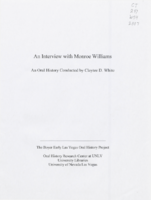
Transcript of interview with Monroe Williams by Claytee D. White, August 15, 2000
Date
Archival Collection
Description
Interview with Monroe Williams conducted by Claytee D. White on August 15, 2000. Williams was one of the first black firefighters in 1963, later becoming involved in real estate. He and his wife, Brenda Williams, were community leaders.
Text
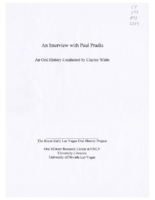
Transcript of interview with Paul Pradia by Claytee D. White, July 13, 2010
Date
Archival Collection
Description
Interview with Paul Pradia conducted by Claytee D. White on July 13, 2010. Pradia, who moved to Las Vegas in 1995, teaches golf and is a board member of 1st Tee of Southern Nevada and the Nevada Senior Games, working to promote women golfers. He remains an active member of Omega Psi Phi fraternity.
Text
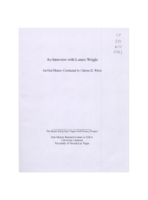
Transcript of interview with Lonnie G. Wright by Claytee D. White, October 23, 2009
Date
Archival Collection
Description
Interview with Lonnie G. Wright conducted by Claytee D. White on October 23, 2009. Wright played basketball at UNLV and became a successful local educator and businessman. His grandmother worked as a maid for prominent Las Vegans.
Text
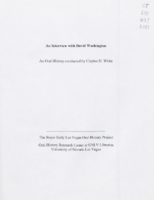
Transcript of interview with David Washington by Claytee D. White, March 18, 2009
Date
Archival Collection
Description
Interview with David Washington conducted by Claytee D. White on March 18, 2009. Washington began his career as a firefighter in 1974. In 2001, he became the first African American fire chief for the City of Las Vegas.
Text
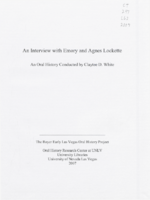
Transcript of interview with Emory and Agnes Lockette by Claytee D. White, March 11, 2005
Date
Archival Collection
Description
Interview with Emory and Agnes Lockette conducted by Claytee D. White on March 11, 2005. The Lockettes were the only African Americans to live in Boulder City during years of racial tension. Agnes taught kindergarten at Westside School, while Emory worked for the Bureau of Reclamation.
Text
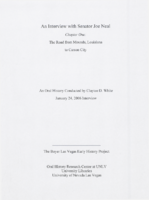
Transcript of first interview with Senator Joe Neal by Claytee D. White, January 24, 2006
Date
Archival Collection
Description
First interview in a series of five with Nevada State Senator Joe Neal conducted by Claytee D. White on January 24, 2006. Born in Mounds, Louisiana, in 1935, Neal joined his family in Las Vegas as a young man shortly before serving in the United States Air Force from 1954 to 1958. Following his military service, he earned a bachelor's degree in political science at Southern University in Baton Rouge, Louisiana. Neal continued his education at the Institute of Applied Science in Chicago, Illinois, with postgraduate work in law. From 1973 to 2001, he served in the Nevada Legislature as the Senator from Clark County Senatorial District No. 4. In the first interview, Neal recalls his childhood, moving to Las Vegas as a teenager, and joining the Air Force. He discusses his early experiences in politics and his involvement in various issues.
Text
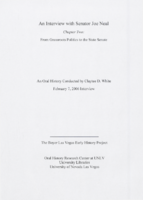
Transcript of second interview with Senator Joe Neal by Claytee D. White, February 7, 2006
Date
Archival Collection
Description
Second interview in a series of five with Nevada State Senator Joe Neal conducted by Claytee D. White on February 7, 2006. Born in Mounds, Louisiana, in 1935, Neal joined his family in Las Vegas as a young man shortly before serving in the United States Air Force from 1954 to 1958. Following his military service, he earned a bachelor's degree in political science at Southern University in Baton Rouge, Louisiana. Neal continued his education at the Institute of Applied Science in Chicago, Illinois, with postgraduate work in law. From 1973 to 2001, he served in the Nevada Legislature as the Senator from Clark County Senatorial District No. 4. In the second interview, Neal focuses on his work during the 1960s and 1970s.
Text
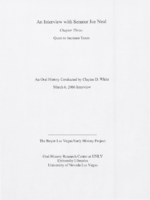
Transcript of third interview with Senator Joe Neal by Claytee D. White, March 3, 2006
Date
Archival Collection
Description
Third interview in a series of five with Nevada State Senator Joe Neal conducted by Claytee D. White on March 3, 2006. Born in Mounds, Louisiana, in 1935, Neal joined his family in Las Vegas as a young man shortly before serving in the United States Air Force from 1954 to 1958. Following his military service, he earned a bachelor's degree in political science at Southern University in Baton Rouge, Louisiana. Neal continued his education at the Institute of Applied Science in Chicago, Illinois, with postgraduate work in law. From 1973 to 2001, he served in the Nevada Legislature as the Senator from Clark County Senatorial District No. 4. In the third interview, Neal shares details of his service to Nevada. He recalls legislation enacted to achieve integration of the hotels and unions, his efforts to increase state taxes on the gaming industry, and his successful campaign strategies. Neal also relates the history of the Economic Opportunity Board in Nevada and predicts the outcome of the 2006 gubernatorial race.
Text
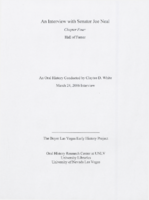
Transcript of fourth interview with Senator Joe Neal by Claytee D. White, March 24, 2006
Date
Archival Collection
Description
Fourth interview in a series of five with Nevada State Senator Joe Neal conducted by Claytee D. White on March 24, 2006. Born in Mounds, Louisiana, in 1935, Neal joined his family in Las Vegas as a young man shortly before serving in the United States Air Force from 1954 to 1958. Following his military service, he earned a bachelor's degree in political science at Southern University in Baton Rouge, Louisiana. Neal continued his education at the Institute of Applied Science in Chicago, Illinois, with postgraduate work in law. From 1973 to 2001, he served in the Nevada Legislature as the Senator from Clark County Senatorial District No. 4. In the fourth interview, Neal shares opinions on capital punishment, southern Nevada utility ownership, the ethics and political influence of the gaming industry, high hospital costs, and the bailout of the Economic Opportunity Board, among other issues. He comments on his induction into the Nevada State Senate Hall of Fame and reviews changes in Las Vegas over the years, particularly in education. Neal closes with thoughts on the future of downtown Las Vegas and the potential impact of planned renovations and high-rise buildings on the Westside.
Text
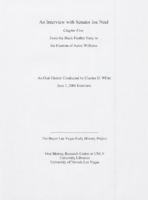
Transcript of fifth interview with Senator Joe Neal by Claytee D. White, June 1, 2006
Date
Archival Collection
Description
Fifth interview in a series of five with Nevada State Senator Joe Neal conducted by Claytee D. White on June 1, 2006. Born in Mounds, Louisiana, in 1935, Neal joined his family in Las Vegas as a young man shortly before serving in the United States Air Force from 1954 to 1958. Following his military service, he earned a bachelor's degree in political science at Southern University in Baton Rouge, Louisiana. Neal continued his education at the Institute of Applied Science in Chicago, Illinois, with postgraduate work in law. From 1973 to 2001, he served in the Nevada Legislature as the Senator from Clark County Senatorial District No. 4. In the fifth interview, Neal recalls the rise of the Black Panther Party and the atmosphere of fear when Patty Hearst was kidnapped by the Symbionese Liberation Army. In closing, Neal relates that voting machines were impounded to protect votes for Aaron Williams, the first black elected to the city council of North Las Vegas, and shares memories of Judge Mendoza.
Text
